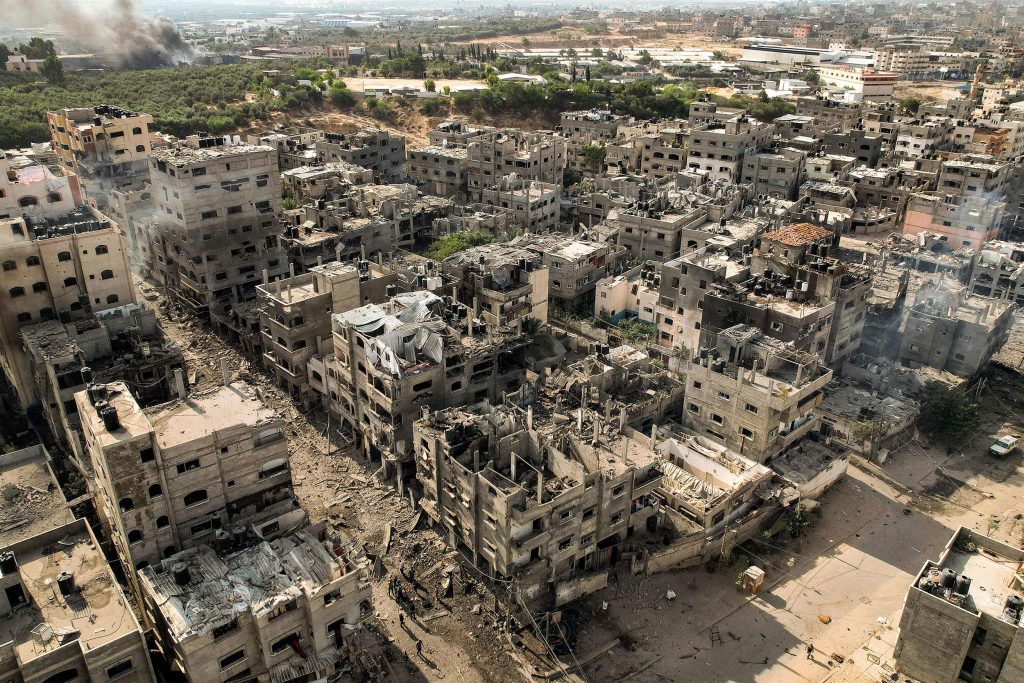By Nada Bashir, Kareem El Damanhoury, Ali Younes, Mohammed Tawfeeq and Rhea Mogul, CNN
Gaza and Jerusalem (CNN) — Gaza’s humanitarian crisis deepened Thursday as Israeli jets continued to pound the densely populated enclave in response to Hamas’ brutal terror attacks, while Israel’s government formed an emergency war cabinet and ordered hospitals to prepare for an expected escalation of violence.
The decades-old conflict between Israelis and Palestinians entered uncharted territory this week after Israel suffered its worst attack by Palestinian militants since its founding 75 years ago.
Israel has stepped up its offensive in Gaza following Hamas’ October 7 onslaught, when armed militants poured over the heavily fortified border into Israel.
The gunmen killed more than 1,200 people, wounding thousands more in a coordinated rampage through farms and communities where they also took as many as 150 hostages.
The atrocities have sparked international revulsion and vows by Israel’s government to destroy Hamas, which has continued to fire rockets at Israeli towns over the last five days.
At least 1,354 people have since been killed in Gaza, according to the Palestinian Health Ministry.
More than 6,000 have been wounded, the ministry said, as Israeli air strikes continue to pummel the densely populated strip, decimating buildings, reducing entire streets to rubble and trapping residents.
Israel has ordered a “complete siege” on the enclave of 2 million people, including halting supplies of electricity, food, water and fuel.
On Thursday, Israel’s Energy Minister Israel Katz said supplies would remain cut off until hostages being held by Hamas are freed. “No electrical switch will be turned on, no water hydrant will be opened, and no fuel truck will enter until the Israeli abductees are returned home. Humanitarian for humanitarian. And no one will preach us morals,” Katz said on social media.
More than 330,000 people have been displaced in Gaza, according to a statement by the United Nations Office for Coordination of Humanitarian Affairs (OCHA) early Thursday.
Gaza’s only power station stopped working on Wednesday after running out of fuel, the head of the Gaza power authority Galal Ismail told CNN.
Hospitals are expected to run out of fuel on Thursday, leading to “catastrophic” conditions, the Palestinian Health Ministry warned.
A surge in injured people seeking treatment has pushed Gaza’s health infrastructure close to breaking point, Ashraf Al-Qudra, a spokesperson for the Ministry of Health in Gaza, said on Thursday. “Even after expansion, all beds are occupied, leaving no room for new patients in critical condition,” he said.
Palestinian Minister of Health Mai al-Kaila has called for urgent international assistance to help set up field hospitals in the Gaza Strip and to provide medicines and medical supplies.
Video and photos from the besieged enclave depict scenes of tragedy and heartbreak.
“There are body parts scattered everywhere. There are still people missing,” one man in the northern neighborhood of Al-Karama said. “We’re still looking for our brothers, our children. It’s like we’re stuck living in a nightmare.”
‘Possible escalations’
In response to Hamas’ assault Israel has massed some 300,000 reservists near the Gaza border, according to the Israel Defence Force (IDF), a huge mobilization given the country’s 9 million population.
On Thursday, the IDF said it was continuing “large-scale strikes on terror targets belonging to the Hamas terrorist organization in the Gaza strip,” as speculation of a possible ground incursion into Gaza grows.
“We have sent our infantry, armored soldiers, our artillery corps and many other soldiers from the reserves. 300,000 in numbers in different brigades,” Lt. Col. Jonathan Conricus said Wednesday.
“They are now close to the Gaza Strip, getting ready to execute the mission that they have been given,” he added.
Israel’s government also said it was preparing its hospitals and healthcare system for “possible escalations in the security situation,” its health ministry said.
Hamas’ attack has also sparked some political unity in Israel after months of domestic friction with Prime Minister Benjamin Netanyahu and National Unity Party leader Benny Gantz jointly announcing an emergency government and war management cabinet on Wednesday.
Gantz, a former defense minister, will join Netanyahu and current defense minister Yoav Gallant in a wartime cabinet.
“There is time for war and time for peace. This, now, is the time for war,” Gantz said during a televised address.
A diplomatic push is being made to try and bring about some sort of mediation.
US Secretary of State Antony Blinken arrived in Tel Aviv on Thursday and met with Netanyahu.
Blinken is scheduled to meet Palestinian President Mahmoud Abbas and King Abdullah II of Jordan on Friday, according to a US official.
Abbas leads the Palestinian Authority (PA), which was established in the Israeli-occupied West Bank in 1993 through the Oslo Accords, a peace pact between Israel and the Palestine Liberation Organization (PLO). It stipulated the PLO give up armed resistance against Israel in return for promises of an independent Palestinian state alongside Israel.
The PA are rivals to Hamas.
Meanwhile, Saudi Arabia’s Crown Prince Mohammed Bin Salman received a call from Iran’s President Ebrahim Raisi on Wednesday in which they discussed the “military escalation in Gaza,” Saudi Press Agency (SPA) reported.
Horror stories
The scale and nature of Hamas’ attacks have horrified Israelis with each day bringing new testimonies of both atrocities committed as well as astonishing tales of survival and bravery amidst the carnage.
Tom Hand, a resident of the Be’eri, a kibbutz where Hamas gunmen left at least 120 dead, learned his daughter Emily, 8, was among the murdered.
“I knew she wasn’t alone, she wasn’t in Gaza, she wasn’t in a dark room filled with Christ knows how many people, pushed around… terrified every minute of every day, possibly for years to come. So death was a blessing,” he told CNN, his voice broken, tears streaming down his tired, ashen face.
The fact that Hamas has taken an unprecedented number of hostages now complicates Israel’s response.
On Wednesday, International IDF spokesperson, Lieutenant Colonel Jonathan Conricus, told CNN that Israeli authorities believe the hostages are being held underground.
“Reason dictates that they are underground,” he said. “Reason also dictates that Hamas, since they planned to launch this attack and they planned to take these people hostage, reason dictates that they planned in advance locations to hide these hostages and keep them safe from Israeli intelligence, and efforts to get them out.”
He said even though Israel has had “some experience” with hostage situations they have never dealt with anything like this.
Izzat al-Risheq, a senior Hamas official, told CNN on Wednesday that it’s too early to exchange Israeli hostages.
“There were many calls made by Arab and non-Arab states to Hamas leadership abroad asking about the possibility of exchanging Israeli captives with Hamas prisoners,” al-Risheq said from Doha, Qatar.
“But we told everybody that it’s now too early to discuss it while Israel continues to pound Gaza and kill Palestinian civilians indiscriminately.”
‘Everything started falling on us’
That bombardment has taken an increasing toll on Gaza.
More than 2 million Palestinians – including over a million children – live in the Gaza Strip, an area that has been under a land, sea and air blockade, enforced by Israel since 2007.
It has been almost completely cut off from the rest of the world for nearly 17 years, when Hamas seized control, prompting Israel and Egypt to impose a land, air and naval blockade, which has continued ever since.
On Thursday, the International Committee of the Red Cross said hospitals in the enclave “risk turning into morgues” following Israel’s siege.
“As Gaza loses power, hospitals lose power, putting newborns in incubators and elderly patients on oxygen at risk,” ICRC regional director for the Near and Middle East, Fabrizio Carboni, said in a statement.
He added the organization is in touch with Hamas and Israeli officials to address the release of the dozens of hostages held by the Islamist militant group.
“As a neutral intermediary we stand ready to conduct humanitarian visits; facilitate communication between hostages and family members; and to facilitate any eventual release,” Carboni said.
The UN agency for Palestinian refugees (UNRWA) said Wednesday it is urgently seeking $104 million to provide with its humanitarian response to the civilians impacted by the escalation of violence in Gaza.
“We are extremely worried that what is happening now is totally unprecedented,” Najla Shawa, an Oxfam worker in Gaza, told CNN. “We are talking about entire areas, not just one area. Entire areas are being wiped and destroyed.”
Hospitals are already overrun with injured patients, many of whom are children.
“I was sleeping, and then suddenly everything started falling on us,” one little girl waiting in a hospital with blood all over her face, told CNN.
“Someone came and helped me out, they took me straight to the hospital. But I don’t know what happened to all of my sisters.”
The-CNN-Wire
™ & © 2023 Cable News Network, Inc., a Warner Bros. Discovery Company. All rights reserved.






More Stories
Israeli military operations in Rafah expand
Miss Teen USA steps down days after Miss USA’s resignation
Weather forecast: Thursday, May 9, 2024